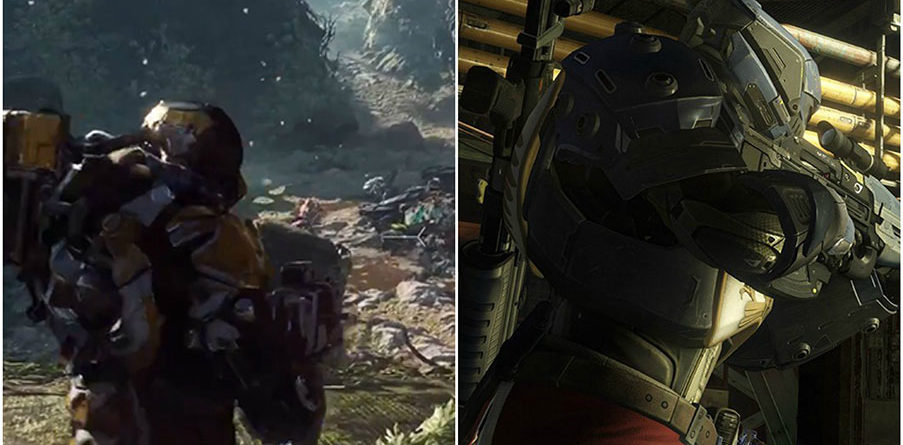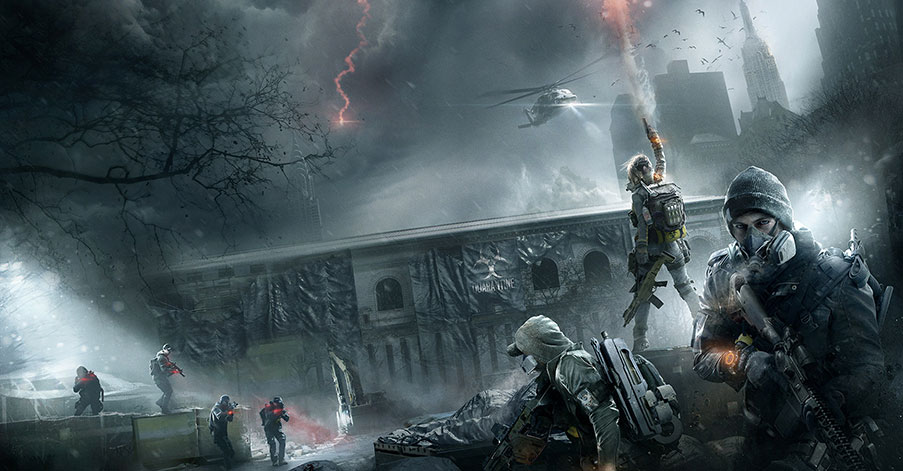Multiplayer-centric games — particularly loot shooters — are an infamous part of the industry nowadays. Broken promises are almost always inevitable by the time these products of expectation release. The problem will only get worse if developers do not listen to the community. The latest concern comes in the form of Anthem, one of the most anticipated games of next year. But before discussing its possible disappointing release, let’s go back to the root of the problem.
Expectation & Deceit: Destiny
The recent outrage originally stemmed from the hype generated by Destiny — a game revealed at E3 4 years ago. It had a $400mil marketing campaign therefore should not need an introduction but the game is online-only and developed by Bungie. The developers made the much-beloved franchise Halo, and that fact alone heavily sold the game. Another reason for the mass appeal Destiny generated lied within the warped showcasing and advertising. The gaming public was often introduced to ideas of exploring a sprawling and dynamic world with your friends while forging a unique ‘destiny’. The title paralleled the game’s presentation as it tried to convey this epic feel of how much each player mattered to an overarching story. The game almost seemed like it would be the FPS equivalent of World of Warcraft.
E3 viewers were convinced that Destiny was going to be a very dynamic and connected social game. Alongside this, players thought it was going to be on the same level of world-building as the developer’s previous franchise. And, sure enough, it was a huge financial success, making over $500 million on launch day. Destiny’s critical reception was not so kind though as it received many mixed reviews. Not only that, but the community widely regard it as the most disappointing game of 2014. This was for a number of reasons — the receptivity of the gameplay, its shallow narrative and a sense that your ‘destiny’ was to grind endlessly. The end goal: superficially varied gear and skins. Destiny was a prime example of production values over substance.
Expectation & Deceit Part 2: The Division
Another entry to the mediocrity was a multiplayer-only game called The Division, which did not have the most revered developer (Massive Entertainment) nor publisher (Ubisoft) but made up for that with a fantastic E3 demo in 2013 that simulated a unique player-driven world with ever-changing events. It did not promise the same amount of rich lore like Destiny but focused on fluid gunplay and moments of pure intensity.
Like Destiny, it also broke records in terms of financial success, making over $330 in its first week of launch and it garnered mostly positive reviews. Despite this, it has received a backlash from the overall gaming community, pointing out the tedium of the gameplay and a lack of a good story to drive the player in favor of an unfulfilling loot system. The Division and Destiny garnered good sales because of good marketing. In the modern gaming industry, however, “good” marketing is mostly false advertising.
The Promise of Anthem
Fast forward to 2017 and there is now another multiplayer-only game with a similar premise and another acclaimed developer behind it. This is ‘Anthem’, developed by Bioware of Mass Effect and Dragon Age franchise fame. Anthem is set in a seemingly imaginative world, alike what Destiny showed. It seems enticing — to explore a completely new universe made by one of the kings of video game storytelling. Mass Effect is, hands-down, one of the greatest Sci-fi universes of the 21st century. I would even argue similar superlative titles toward their other major franchise, given consideration to all mediums. Everyone is eagerly anticipating Anthem’s release. Unfortunately, though, it is very likely that the anticipation will lead to sheer disappointment. This is due to the game’s E3 presentation following too much in the deceptive digital steps as Destiny and The Division before it.
Anthem is a spectacular-looking game in some aspects, though. Its graphics are leaps ahead of any game they have made before and, as stated before, their knack for building a world from the ground-up shows, however faint the players’ knowledge of the world is. The cinematic feel and integration of quests look, as director Jonathan Warner describes the game, “frictionless”. So, when I saw these features, I dug deep into the last vestiges of my E3 optimism to believe that what I was seeing was something fresh and exciting. This was until the actual core gameplay started.
False Hopes & Disappointing Déjà Vu
All of that fancy locale and the POV was only a hub. I thought that Bioware had finally reinvented themselves and created an FPS-RPG hybrid, (E.G., Fallout). Not only that, but Anthem seemingly retained those trademarks of Bioware —meaningful choices, well-written dialogue and fleshed-out characters. Alas, quests in Anthem may include short moments of solid dialogue and lore only to be hampered down by monotonous grinding and poor motivation for your actions.
It is turning out like Destiny and The Division all over again. Materialism is prevalent enough in real life, so I personally do not want to farm waves of enemies just to get a new weapon like they do in Anthem’s E3 presentation. This is a game from the same developers of Mass Effect — most gamers will want another epic adventure where you will grow attached to the characters and be a part of a coherent storyline. And I doubt that there will be many memorable plotlines since the focus is on the gameplay, maintenance of the world/servers and players. They, however, will never fill the gap that pre-determined player characters such as Shepard and the Inquisitor will leave.
That will apply to NPCs too. Bioware knows fanbases of looter shooters are more interested in exploring the swathes of areas for equipment so there will be few memorable characters. Quests will fall into pathetic excuses for the players to go out and kill stuff. This is something Bioware themselves detest as they have been at the forefront of varied quests. The developers may have developed The Old Republic which is a very grindy game, but it is within MMORPG expectations. It also incorporates enough of the studio’s signature talents to warrant its critical acclaim and high subscriptions.
Where Developer Influence Should Lie and How We Should Approach E3
Previous developers Bungie and Ubisoft should have looked for influence from stellar titles when making their aforementioned overblown games. The former towards Borderlands for robust features and sense of humour (What jokes there are in Destiny leave you silent); the latter to various survival games that make you feel like you are actually trying to survive in a world plagued by an epidemic rather than being a grunt shooting everything in your path.
Bioware’s influence should pertain to the infamy of both Destiny and The Division. They have inadvertently set a course for many copy-and-paste social shooters to come. Bioware seems to value their player base more than both developers, however. Making several updates to Mass Effect Andromeda after various complaints, they proved their devotion recently. And with a 10-year deal for Anthem, hopefully, they will listen to the players who are ultimately unsatisfied.
Overall, there is a pivotal lesson that the community should take from Anthem’s very possible downfall. This is to take E3 demos with a very small pinch of salt. They are becoming more cinematic and deceptively organized than ever. However, shooters build upon chaos, making these demonstrations useless. Scripted gameplay simply does not represent the final product. As a big fan, I hope Bioware can effectively combine a filmic feel, fun gameplay, and a dense storyline. Only then will Anthem sing a fine tune.












